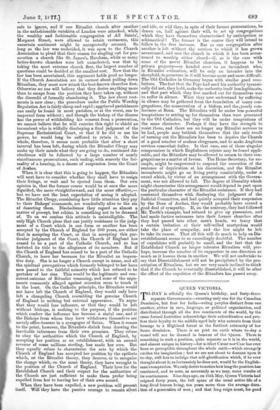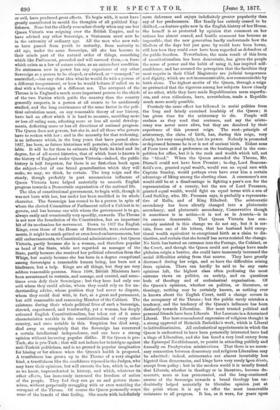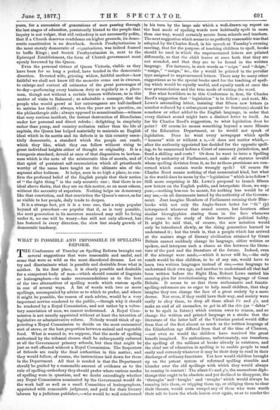QUEEN VICTORIA.
TO-DAY is officially the Queen's birthday, and forty-three separate Governments—counting only one for the Canadian Dominion, but four for India—ruling peoples distinct from one another, either in race, language, or political organisation, and distributed through all the five continents of the world, by the same formal festivities acknowledge their subordination and pro- fess their loyalty to the middle-aged lady who retreats from their homage to a Highland forest at the furthest extremity of her home dominion. There is no port on earth where to-day a vessel will not be dressed in honour of the Queen. There is something in such a position, quite separate as it is in the world, and almost unique in history—for neither Caesar nor Czar has ever been so perceptible throughout the whole earth—which strangely excites the imagination ; but we are not about to descant upon it to-day, still less to indulge that self-glorification which, if he ever thought about it, as fortunately he does not, would be the English- man's temptation. We only desire to notice how long the position has continued, and to note, as accurately as we may, some results of its continuance. Nine days ago, on 24th May, Queen Victoria had reigned forty years, the full space of the usual active life of a long-lived human being, ten years more than the average dura- tion of a generation of men ; and that long reign must, for good
or evil, have produced great effects. To begin with, it must have greatly contributed to mould the thoughts of all political Eng- lishmen. None but the elderly remember clearly when any one but Queen Victoria was reigning over the British Empire, and to have advised any other Sovereign, a Statesman must now be in the extremity of ordinary age. All the men who now rule us have passed from youth to maturity, from maturity to old age, under the same Sovereign, till she has become in their minds part of the natural order of things, something which like Parliament, preceded and will succeed them,—a force which exists as a law of nature exists, as an antecedent condition. No statesman now in power has any experience of any other Sovereign as a person to be obeyed, or advised, or " managed," or controlled,—has any clear idea what he would do with a person of a different temperament, or how he would behave if called on to deal with a Sovereign of a different sex. The occupant of the Throne is in England a much more important person to the chiefs of the two Parties which guide the country than the country generally suspects, is a person at all events to be assiduously studied, and the long continuance of the same factor in the poli- tical calculation must, on any reasonable theory of our history, have had an effect which it is hard to measure, moulding more or less all ruling men, affecting more or less all social develop- ments, deflecting more or less all directions of national progress. The Queen does not govern, but she is, and all those who govern have to reckon with her ; and in the necessity for that reckoning, is an influence which, in the long years that have passed since 1837, has been, as future historians will perceive, almost incalcu- lable. It will be for them to estimate fully both its kind and its degree, for of all secret histories, that of which least is known the history of England under Queen Victoria—indeed, the public history is half forgotten, for there is no first-class book upon the subject—but of one broad generalisation which they will make, we may, we think, be certain. The long reign and the steady, though probably in part unconscious influence of Queen Victoria have helped materially to smooth English progress towards a Democratic organisation of the national life.
The idea of constitutional government, to begin with, though it was not born with her, has under her been modified in its whole character. The Sovereign has ceased to be a person in spite of whom the elected Committee of Parliament called a Cabinet is to govern, and has become one with whom the government is to go, always easily and occasionally very speedily, onwards. The Throne is not now the foundation of the Constitution, but an important bit of its mechanism kir movement. Down to 1837 the English Kings, even those of the House of Brunswick, were embarrass- ments, it might be much-prized or even loved embarrassments, but still embarrassments, to Constitutional administrators ; but Queen Victoria, partly because she is a woman, and therefore popular as head of the State, while not regarded as manager of the State, partly because she received her political education from the Whigs, but mainly because she has been in a degree exceptional among Sovereigns a reasonable human being, has been not a hindrance, but a help. Kings are all things, but they are very seldom reasonable persons. Since 1688, British Ministers have been accustomed to restrain, and manage, and control, and some- times even defy their Sovereigns ; but they have had only one with whom they could advise, whom they could rely on for un- derstanding advice, whose position they had never to dispute, whom they could deal with, in fact, as a great and permanent, but still reasonable and reasoning Member of the Cabinet. The existence during their whole political lives of such a Sovereign, shrewd, experienced, and trustworthy, yet a woman, has deeply coloured English Constitutionalism, has taken out of it some characteristics notable in the constitutionalism of every other country, and once notable in this. Suspicion has died away, died away so completely that the Sovereign has recovered a certain intellectual independence, and can have a strong opinion without incurring popular dislike. If the Queen is pro- Turk, she is pro-Turk ; that will not induce her to intrigue against anti-Turkish politicians, and is no ground in popular imagination for hissing or for silence when the Queen's health is proposed. A trustfulness has grown up in the Throne of a very singular kind, a trustfulness like the confidence reposed in the Judges, who may have their opinions, but will execute the law, which is, so far as we know, unprecedented in history, and which, whatever its other effects, has immensely increased the freedom of action of the people. They feel they can go on and govern them- selves, without perpetually struggling with or even watching the occupant of the Throne. Of course the Queen personally reaps some of the benefit of that feeling. She meets with indefinitely more deference and enjoys indefinitely greater popularity than any of her predecessors. Her family has entirely ceased to be disliked,—a feature quite new in the English history of- her House. She herself is so protected by opinion that comment on her actions has almost ceased, and hostile comment has become so impossible, that the new generation hardly understands how the libellers of the days but just gone by could have been borne, still less how they could ever have been regarded as defenders of the public freedom. Nevertheless, the main result of this form of constitutionalism has been democratic, has given the people the sense of power and the habit of using it, has inspired self- confidence, and has aroused the perception that the faculties they most require in their Chief Magistrate are judicial temperance and dignity, which are not incommunicable, nor communicable by birth alone. The highest merits of the Queen, through a reign so protracted that the vigorous among her subjects know clearly of no other, while they have made Republicanism seem superflu- ous, and even ridiculous, have, nevertheless, made a Republic much more nearly possible.
Precisely the same effect has followed in social politics from the long and faintly exercised headship of the Queen ; it has given time for the aristocracy to die. People will exclaim as they read that sentence, and say the aristo- cracy was never more alive, but they are deceived by their experience of this present reign. The root - principle of aristocracy, the claim of birth, has, during this reign, very slowly, but very completely, lost its power. Nobody is promoted or depressed because he is or is not of ancient birth. Eldest sons of Peers have still a preference on the hustings and in the com- petition for office, but it is the rank and wealth which tell, not the " blood." When the Queen ascended the Throne, Mr. Disraeli could not have been Premier ; to-day, Lord Beacons- field's son, granted equal wealth, would run an equal race with Captain Stanley, would perhaps even have over him a certain advantage of liking among the electing class. A commoner's son would still be at a disadvantage in fighting a peer's son for the representation of a county, but the son of Lord Penzance, granted equal wealth, would fight on equal terms with a son of Lord Sudeley, who, Mr. Freeman says, is probably a representa- tive of Rollo, and of King Ethelred. The aristocratic ascendancy has been silently changed into a plutocratic ascendancy,- and plutocratic ascendancy, Conservative though it sometimes is in action—it is not so in Austria—is in its essence democratic. That Queen Victoria has con- sciously assisted in this change we do not say, but it is cer- tain, from one of his letters, that her husband held excep- tional wealth equivalent to exceptional birth as a claim to dis- tinction, and certain that she herself has never resisted the change. No birth has barred an entrance into the Peerage, the Cabinet, or the Court, and though the Queen could not perhaps have made plebeian origin a barrier, she could have immensely increased the social difficulties arising from that source. They have greatly decreased during her reign, and so have the difficulties arising from opinion. There can hardly be said to be any caste opinions left, the highest class often professing the most extreme views on politics, on society, and on questions both of theology and of ecclesiastical organisation. Of the Queen's opinions, whether on politics, or literature, or theology, nothing may be certainly known, as nothing ever is known about the English Court, until a change occurs in the occupancy of the Throne ; but the public rarely mistakes a tendency, and the tendency of the Queen's influence has been distinctly towards Liberalism. Her most trusted political and personal friends have been Liberals. Her Laureate is a determined Liberal. Her best-remembered expression of religious thought is a strong approval of Heinrich Zschokke's work, which is Liberal to latitudinarianism. All ecclesiastical appointments in which the Queen is understood to have been personally interested have had a tinge of Liberalism, and she has faced a very loud outcry from the Episcopal Establishment, to persist in attending publicly and formally on Presbyterian ministrations. That there is no neces- sary connection between democracy and religious Liberalism may be admitted ; indeed, aristocracies are almost invariably less bigoted than democracies, and kings have very rarely lien divots, except from policy ; but in the modern world it is usually found that Liberals, whether in theology or in literature, become de- mocrats, more or less pronounced, and the long-continued swerve of the Sovereign towards a broad theology has un- doubtedly helped materially to liberalise opinion just at the point where it is apt to offer the most immovable resistance to all progress. It has, as it were, for years upon years, for a succession of generations of men passing through the last stages of education, persistently hinted to the people that inquiry is not vulgar, that old orthodoxy is not necessarily polite, that if a Church deserves confidence on higher grounds, its demo- cratic constitution is no drawback. Scotch Presbyterianism is the most sternly democratic of organisations, was indeed framed to baffle Kings ; and Scotch Presbyterianism is, next to the Episcopal Establishment, the form of Church government most openly favoured by the Queen.
Even the personal virtues of Queen Victoria, visible as they have been for so long a period, have tended in the democratic direction. Devoted wife, grieving widow, faithful mother—how faithful we shall not know till the memoirs come out in swarms, to enlarge and correct all estimates of the great personages of to-day—performing every business duty as regularly as a place- man, though not without a certain human wilfulness, as in this matter of visits to Balmoral ; so admirable a manager, that the . people who would growl at her extravagance are half-inclined to satirise her thrift ; always, when the poor are in question, on the philanthropic side ; always opposed to sensationalism—witness that very curious incident, the instant destruction of Blondinism under her personal and direct rebuke ; delighting in simplicity rather than pomp, and country seclusion rather than the life of capitals, the Queen has helped materially to maintain an English ideal which in its merits and its defects is in this country essen- tially democratic, a standard which the people can reach, which they like, which they can follow without rising to great individual heights either of thought or originality. It is a bourgeois standard, devoid at once of that disposition to lawless- ness which is the note of the aristocratic idea of morals, and of that spirit of persistent self-renunciation which all priesthoods worthy of the name have taught as the ultimate aim of the aspirant after holiness. It helps, seen in so high a place, to con- firm the profound belief of the English people that their notion of " the right thing " is the only accurate one ; that there is no ideal above theirs, that they are on this matter, as on most others, without the necessity of superiors. Nothing helps on democracy like that conviction, and that conviction the Queen's career, as far as visible to her people, daily tends to deepen.
It is a strange fact, yet it is a true one, that a reign popular beyond all precedent—so popular that if, as is very possible, the next generation in its maturest manhood may still be living under it, no one will be weary—has still not only allowed, but has fostered in every direction, the slow but steady growth of democratic tendency.




































 Previous page
Previous page